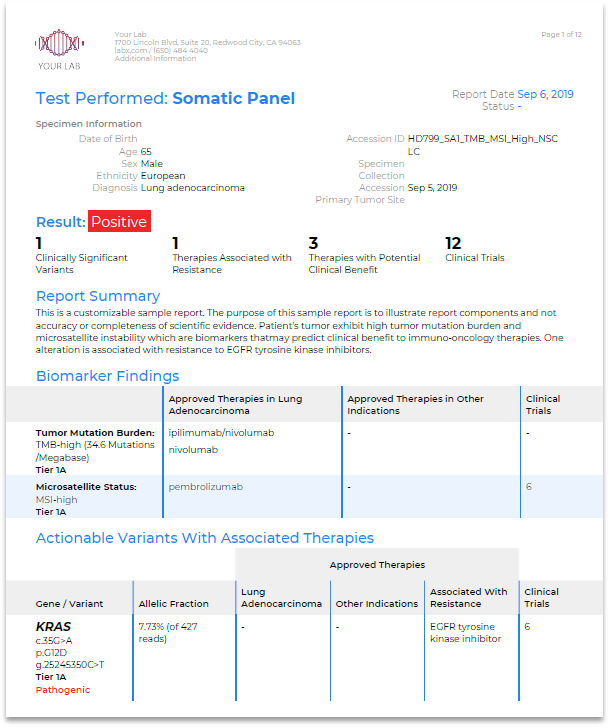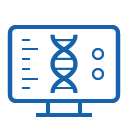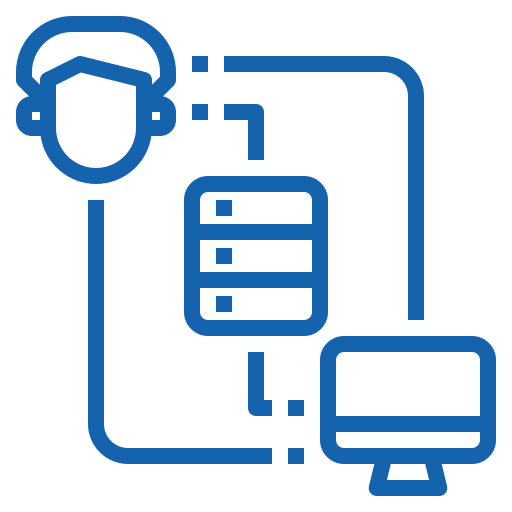臨床的意思決定サポートソフトウェアまたは専門的な解釈サービスによって、あらゆるがんの様々な変異に対応した患者個別の診断および予後に関するレポートをがん専門医に提供します。
がんに関しては、簡単なものは何もありません。がんに関わる診断は人生を変えてしまうほど大きな影響力を持つため、診断と治療方針の決定に影響を与える遺伝子検査ラボが常に最新の関連データを把握しているという確証を、腫瘍専門医は必要としています。
QIAGEN Clinical Insights(QCI)for Oncology は、専門家がキュレートしたコンテンツを分子病理学者に提供することで、遺伝子レベルでの変異の生物学的特性と患者の腫瘍プロファイルとの臨床的関連性を知的にナビゲートするソフトウェアおよびサービスです。 QCI for Oncology ではあらゆる種類のがんに生じる変異を解釈できるため、拡大し続ける検査メニューに対応しつつ、証拠に基づき個別化された治療の推奨事項を分子病理学者に提供することをサポート援します。
ファーストクラスの NGS バリアント解釈およびレポートパイプラインを構築する場合でも、テスト結果を解釈するための経験豊富なパートナーを探す場合でも、QCI for Oncology には、ラボの特定のニーズに適合する信頼できるソリューションが 2 つあります。

精密医療が現実味を帯びるにつれ、分子プロファイリングは多くのがんの種類への対処の標準となっています。 腫瘍学者は、より正確で個別化された治療法の決定を導くための、信頼できる高品質の分子情報を得るために、信用のおけるプロファイリングパートナーをこれまで以上に必要としています。
QCI for Oncology は、体細胞変異の解釈と報告に関する AMP/ASCO/CAP ガイドラインに従って報告の標準化を可能にし(4)、ACMG ガイドラインに基づいて生物学的インサイトを提供します(5)。
結果の一貫性と再現性を確保する目的で、QCI for Oncology は、変異分類をサポートする基準と証拠のレビューのために完全な透明性を提供し、募集中の治験レジストリと利用可能な FDA 承認済みの治療法をリアルタイムで可視化します。


自施設でバリアントの解釈とレポート作成を実行する分子診断ラボでは、QCI Interpret を使用すると、シークエンスプラットフォーム上のあらゆるアッセイにかかるターンアラウンドタイムを短縮し、信頼性の高いレポートを作成できます。

受託変異解析で大きな実績のある N-of-One を用いる QCI Precision Insights は、体細胞変異の解釈をアウトソーシングする分子診断ラボ向けに、迅速なターンアラウンドタイムと患者固有のレポート用にカスタマイズされたバリアントレベルの解釈を提供します。

パイプライン開発から二次解析、バリアントキュレーションまで、QIAGEN Clinical Testing Services はカスタマイズされた end-to-end の臨床レポートソリューションを提供し、ラボの検査スケールの拡大と収益性の向上に貢献します。

NGS の初心者でも経験豊富なユーザーでも、QCI for Oncology がラボの効率、信頼性、およびテストメニューの提供をどのように向上させるかご確認ください。